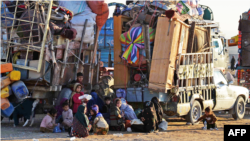On December 26, The Times of India reported that Pakistan has been deporting Afghan refugees who had been granted resettlement in the United States.
“Pakistan deported Afghans waiting for US resettlement: Sources,” The Times of India posted on X.
Pakistan has denied targeting Afghan refugees for deportation. In October, Pakistan’s Foreign Ministry said the country’s deportation policy affects all "illegal” refugees “no matter their nationality,” and that reports “associating” the deportations with Afghan refugees are the result of “misunderstanding or misrepresentation.”
However, The Times of India report is true: Pakistan, as international rights watchdogs have documented, continues to deport Afghan refugees en masse, including Afghan refugees waiting for U.S. resettlement.
The situation has become more acute since the Taliban returned to power in Afghanistan in 2021, with Refugees International, a global network to aid refugees, reporting last September that more than 600,000 Afghans had sought refuge in Pakistan since Kabul fell to the Taliban.
Amnesty International, citing the Pakistani government, reported last November that 49 deportation centers had been set up across Pakistan. The human rights group, again citing the Pakistani government, reported that, at that time, “more than 170,000 Afghans, many of whom have lived in Pakistan for decades, have had to leave the country since 17 September.”
For its part, Human Rights Watch reported in November that Pakistani authorities had “forced out more than 375,000 Afghans to Afghanistan, deporting 20,000 of them.”
On November 1, the U.S. Embassy in Islamabad issued protection letters to 25,000 Afghans as a way of proving to the Pakistani authorities that they are part of the ongoing process for U.S. resettlement.
Citing Afghan families, Reuters reported on December 26 that Pakistani authorities had detained and deported family members despite the fact that they had protection letters from the U.S. embassy. Additionally, Afghans in Pakistan, whose visas expired while awaiting refugee resettlement, face prolonged renewal periods and hefty fees, Reuters said.
Last October, Pakistan ordered more than a million undocumented foreigners, predominantly Afghans, to leave the country by November 1, after which those who remained would be expelled.
The United Nations warned Pakistan in October that such forced deportation could lead to “severe human rights violations,” with families separated and children deported, The Associated Press reported.
Following the November 1 deadline, Pakistani authorities reportedly began rounding up undocumented foreigners.
Reuters, citing the U.N., reported in December that more than 450,000 Afghans have returned home, with many enduring harsh winter conditions near the border.
In December, Shawn VanDiver, president of the U.S.-based NGO #AfghanEvac, told Reuters that Pakistan had deported at least 130 Afghans who were in the process of obtaining U.S. special immigration visas.
Pakistani authorities have also imposed an $830 exit fee on Afghans awaiting resettlement in the United States, United Kingdom and other countries, especially those unable to obtain or renew visas. That fee is not applicable to those returning to Afghanistan.
The Pakistani government has justified the mass expulsions on security grounds, linking a rise in terrorist attacks inside Pakistan with the presence of undocumented Afghan refugees and accusing the Afghan Taliban of harboring members of the banned Tehreek-e-Taliban Pakistan, or TTP, which shares ideological ties with the Afghan Taliban. The Afghan Taliban has denied the accusation.
Last October, Afghan Taliban spokesperson Zabihullah Mujahid urged Pakistan to “reconsider the decision” to deport the Afghans, insisting that Afghan refugees are not undermining Pakistan's security.
The latest expulsions of Afghan refugees from Pakistan are by no means the first. According to the United Nations High Commissioner for Refugees, Pakistan expelled more than 600,000 Afghan migrants, registered and undocumented, in 2016.
Human Rights Watch described the 2016 deportations as the “world’s largest unlawful mass forced return of refugees in recent times.” The subsequent years saw continued deportations, with 150,000 Afghans expelled from Pakistan in 2017 and nearly 50,000 more deported in 2018.
Last November 28, Human Rights Watch accused Pakistani authorities of systematic abuses of Afghan refugees designed to force them to return to Afghanistan, including mass detentions, confiscation of property and livestock, and destruction of identity documents.
According to the Office of the United Nations High Commissioner for Human Rights, or OHCHR, such deportations breach Pakistan’s commitments under the United Nations Convention Against Torture and the international principle of nonrefoulment, which prohibits the forced return of individuals to places where they face a significant risk of torture or persecution.
The concept of refoulement includes not only direct expulsion but also situations where intense indirect pressure leads individuals to feel they must return to a country where they are at risk.
In November, some Pakistani public figures and celebrities protested the mass deportation of Afghan refugees.
Actress and model Armeena Khan posted the following on X (formerly Twitter): "How can we treat them this way? I cannot talk about Gaza without talking about the Afghans."
Another well-known actress, Sanam Saeed, posted the following on X last November 1 — the Pakistani authorities’ deadline for Afghan refugees to leave: "We need to show more mercy at times like this."
On December 1, Pakistan’s highest court launched a hearing on a petition to stop the deportation of Afghans who were born in Pakistan and those whose lives could be at risk if they returned to Afghanistan.
On December 14, Pakistan extended the deadline for the Afghan refugees awaiting resettlement in a third country to February 29, 2024.





